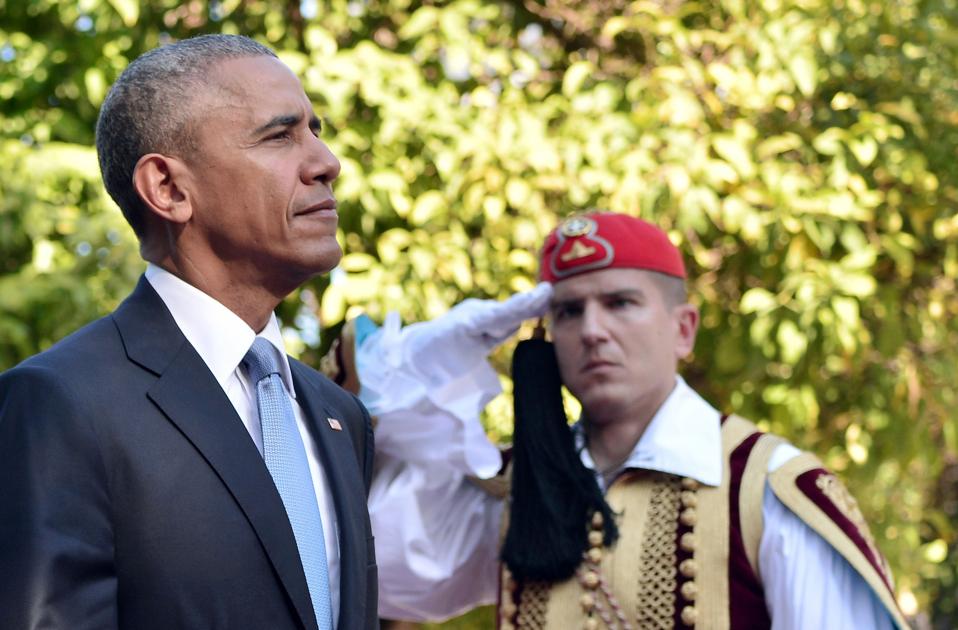On the eve of his last foreign trip as US head of state, President Barack Obama on Monday outlined the purpose of his visit to Greece and Germany, saying that this is part of an effort to help stabilize the global economy. In Greece Tuesday, in remarks with President Prokopis Pavlopoulos and Prime Minister Alexis Tsipras, the American president spoke also of issues that are important for Athens: the Greek economy and the need for debt relief, efforts to solve the Cyprus issue, the refugee crisis and NATO. Below are excerpts from President Obama’s remarks.
Purpose of the trip
Our work has also helped to stabilize the global economy… I’ll spend this week reinforcing America’s support for the approaches that we’ve taken to promote economic growth and global security on a range of issues.
I look forward to my first visit in Greece. And then, in Germany, I’ll visit with Chancellor Merkel, who’s probably been my closest international partner these past eight years. I’ll also signal our solidarity with our closest allies, and express our support for a strong, integrated and united Europe. It’s essential to our national security and it’s essential to global stability. And that’s why the Transatlantic Alliance and the NATO Alliance have endured for decades under Democratic and Republican administrations…
In my conversation with the president-elect, he expressed a great interest in maintaining our core strategic relationships. And so one of the messages I will be able to deliver is his commitment to NATO and the Transatlantic Alliance. I think that’s one of the most important functions I can serve at this stage, during this trip, is to let them know that there is no weakening of resolve when it comes to America’s commitment to maintaining a strong and robust NATO relationship, and a recognition that those alliances aren’t just good for Europe, they’re good for the United States, and they’re vital for the world.
(Press conference in Washington on November 14, 2016)
Greece and the US
I’ve always wanted to come to Greece and I’m delighted to be able to make this part of my last trip overseas as president of the United States.
I think we all know that the world owes an enormous debt to Greece and the Greek people. So many of our ideas of democracy, so much of our literature and philosophy and science can be traced back to roots right here in Athens.
I’m told there’s a saying from those ancient times, kalos kai agathos, when someone or something is good and beautiful on the outside, but is also good and noble on the inside in terms of character and in terms of purpose. And I think that’s a fine description of the friendship that exists between the Greek people and the American people.
Now, the ideas of ancient Greece helped inspire America’s founding fathers as they reached for democracy. Our revolutionary ideas helped inspire Greeks as they sought their own freedom. And Americans came here to help fight for Greek independence. At the dawn of the Cold War, when President Truman committed the United States to the defense of Greece, he said, “I believe that we must assist free peoples to work out their own destinies in their own way.”
To this day, the United States is profoundly grateful for our friendship and alliance with Greece. And I’m personally very grateful to my many friends in the Greek-American community, sons and daughters of Ellines who have found success in every walk of American life.
(In remarks with Prime Minister Alexis Tsipras)
Support for Greece
Obviously, Greece has gone through very challenging economic times over the last several years. And it has been the policy of my administration to do everything we can to work with the Greek government and the Greek people to restore growth and optimism and to alleviate hardship. And we are glad to see that progress is being made, although we recognize that there are significant challenges ahead, and we intend to stand shoulder-to-shoulder with the Greek people throughout this process.
And finally, whether it’s dealing with terrorism, addressing some of the challenges that are occurring in the Middle East, hosting our naval vessels, cooperation in the Aegean Sea, the strong NATO relationship between the United States in Greece is of the utmost importance. And I want to reaffirm not only our appreciation for the Greek people in that alliance, but underscore how important we consider the Transatlantic Alliance.
Support for Europe
We believe that a strong, prosperous and unified Europe is not only good for the people of Europe, but good for the world and good for the United States.
And we also believe that it’s important that all people have opportunity and inclusion in growth inside of Europe. And part of my message as I travel not just to Greece but to meet with other European leaders is to encourage a process that ensures opportunity for all, particularly for the youth of Europe and youth here in Greece.
The refugee crisis
I also want to extend the world’s appreciation for the humanitarian and compassionate manner that Greece has dealt with the severe migration and refugee crisis that’s been taking place.
As I said at the UN Summit on Refugees that I hosted in September, it’s important that we don’t have any single country bear the entire burden of these challenges – that all of us are contributing and participating in alleviating suffering and dealing with migration in an orderly and compassionate way. And we have been very glad to partner with the Greek government in managing this situation appropriately.
The need for debt relief
Our argument has always been that when the economy contracted this fast, when unemployment is this high, that there also has to be a growth agenda to go with it. And it is very difficult to imagine the kind of growth strategy that’s needed without some debt relief mechanism. Now, the politics of this are difficult in Europe. And I think in fairness to some of the governments up north that I know are not always popular here in Greece, it’s important to recognize that, you know, they have their own policies and their populations and their institutions often are resistant to some of these debt relief formulas.
But I think that having seen Greece begin many of these difficult steps toward structural reform, having shown a commitment to change, with the Greek people having endured some significant hardships for many years now, there should be an opportunity I think for both sides to recognize that if we can come up with a durable solution as opposed to each year or every six months having a new negotiation, that that could potentially be good for everyone.
And now that the Greek economy is growing again, the timing may be right.
We spent much of our time discussing the economic situation here in Greece and how Greece can continue to move forward. I know this has been a painful and difficult time, especially for Greek workers and families, pensioners and young people.
This crisis is not an obstruction, but has had a very concrete and devastating impact on the lives and livelihoods of millions of people across this country…
I’ve been clear from the beginning of this crisis that in order to make reforms sustainable, the Greek economy needs the space to return to growth and start creating jobs again. We cannot simply look to austerity as a strategy and it is incredibly important that the Greek people see improvements in their daily lives so that they can carry with them the hope that their lives will get better.
And in this context, as Greece continues reform, the IMF has said that debt relief is crucial. I will continue to urge creditors to take the steps needed to put Greece on a path toward a durable economic recovery because it’s in all of our interests that Greece succeeds. We all want the Greek people to prosper, to be able to provide a good life for their families and their children. That would be good for Greece, that would be good for the European Union, good for the United States, and ultimately, good for the world.
Cyprus
We discussed Cyprus, where the prospects for a just, comprehensive and lasting settlement are the best that they’ve been for some time. It doesn’t mean that success is guaranteed, but the possibility of resolving a decades-long conflict is there and we urge the parties to continue their work. The interests of all Cypriots would be advanced with a bizonal bicommunal federation.
We’re hopeful that a solution that’s durable, which would create new economic opportunities for all the people across Cyprus, is within reach. And it would be a powerful example to the world of what’s possible with diplomacy and compromise.
This is ultimately a negotiation between Cypriots – Turkish Cypriots and Greek Cypriots. And the good news is that you have two leaders who seem genuinely committed to finding compromises and an approach that would serve both their peoples well. If, in fact, you can see a meeting of the minds between them, then the issue will be can we make sure that all of us – the international community, Turkey, Greece, the United States – support that agreement in a way that can be ratified by both sides.
And we’ve invested a lot of time, Vice President Biden’s been actively involved in this. We are encouraged by the progress that’s been made. I think there’s a window in the next few weeks, months, where this issue [will actually be] resolved and I think if we can find an equitable solution, it won’t provide 100 percent of what either side wants. There may be some mechanisms for a transition from status quo to the future that both sides envision, but I think it’s achievable and we’re going to do everything we can to support the process.
(Reply to a question in press conference with PM Tsipras)
NATO
Beyond economic issues, we discussed the pressing security challenges that we face as NATO allies. I want to take this opportunity to commend Greece for being one of the five NATO allies that spends 2 percent of GDP on defense, a goal that we have consistently set but not everybody has met. Greece has done this even during difficult economic times. If Greece can meet this NATO commitment, all our allies should be able to do so.
(Remarks with PM Tsipras)
source: ekathimerini.com, 15/11/2016

